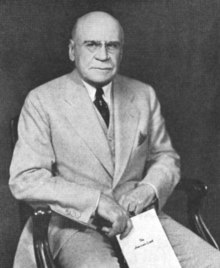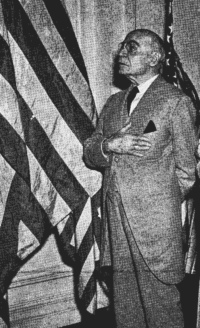William Tyler Page
This article needs additional citations for verification. (June 2011) |
William Tyler Page | |
|---|---|
 | |
| 28th Clerk of the United States House of Representatives | |
| In office May 18, 1919 – December 7, 1931 | |
| Preceded by | South Trimble |
| Succeeded by | South Trimble |
| Personal details | |
| Born | 1868 Frederick, Maryland, U.S. |
| Died | October 19, 1942 (aged 73–74) Washington, D.C., U.S. |
| Resting place | Oak Hill Cemetery |
| Spouse |
Mary Anna Weigangt
(m. 1895; died 1929) |
| Children | 5 |
| Relatives | Carter Braxton (great-great-grandfather) |
William Tyler Page (1868 – October 19, 1942) was an American public servant. He worked on the United States Capitol in Washington, D.C., for 61 years, first as a page boy and later as a clerk of the United States House of Representatives. He was the author of American Creed and Story of Nation’s Capital.
Early life
Page was born in 1868 in
Page began working "twelve hours a day in a printing shop and a paper-bag factory" at the age of 10.[2]
Career
Page began working as a page boy for the United States House of Representatives in Washington, D.C., on December 19, 1881, and he became a clerk in 1919.[3] Page worked for the Capitol for 61 years in total.[3]
In 1917, at 49, Page wrote "The American's Creed," as a submission to a nationwide patriotic contest suggested by Henry Sterling Chapin, of
His submission was chosen in March 1918 over more than 3000 other entries. On April 3, 1918,
Clerk of House of Representatives
In 1919, the year after the war ended, Page was elected Clerk of the House of Representatives from the 66th United States Congress to the 71st Congress ended in 1931. The majority in power in the 1920s was the Republican Party.[5] Later, he was Emeritus Minority Clerk, for the remainder of his life. He was highly respected by members of both major parties throughout his service, as a principled gentleman whose patriotism was inspirational and whose love of America was unquestioned.[according to whom?]

Page died 11 years later, during the first year of America's involvement in the
For many years, Page had also served as the President General of the United States Flag Association.[citation needed] The night before his death, he gave an address to the women's lineage society, the Daughters of the American Revolution on the Golden (50th) Anniversary of the writing of the Pledge of Allegiance to the American Flag (1892).[citation needed]
American's Creed
The
I believe in the United States of America as a government of the people, by the people, for the people; whose just powers are derived from the consent of the governed; a democracy in a republic; a sovereign Nation of many sovereign States; a perfect union, one and inseparable; established upon those principles of freedom, equality, justice, and humanity for which American patriots sacrificed their lives and fortunes.
I therefore believe it is my duty to my country to love it, to support its Constitution, to obey its laws, to respect its flag, and to defend it against all enemies.[6][4]

Page once said:[citation needed]
The American's Creed is a summing up, in one hundred words, of the basic principles of American political faith. It is not an expression of individual opinion upon the obligations and duties of American citizenship or with respect to its rights and privileges. It is a summary of the fundamental principles of American political faith as set forth in its greatest documents, its worthiest traditions and by its greatest leaders.
Personal life, death and legacy
Page resided in
Page died of heart disease on October 19, 1942, in Washington, D.C., at age 74.[1][3] He was buried in the Oak Hill Cemetery.[8] In 1955, the Daughters of the American Revolution added a bronze plaque on his grave at Oak Hill Cemetery.[2]
William Tyler Page Elementary School is located at 13400 Tamarack Road in Silver Spring, Maryland, and it is part of Montgomery County Public Schools.
See also
- American Flag
- Flag Day (United States)
- Sons of the American Revolution
References
- ^
- ^
- ^
- ^ JSTOR 42769915.
In preparation for American Education Week, which will be held throughout the country December 3-9, every child should memorize the following creed which was compiled by William Tyler Page and which was officially adopted by the United States Congress, April 13, 1918
- ^ "Art & History - Clerks". Office of the Clerk of the U.S. House of Representatives. Retrieved June 14, 2011.
66th (1919-21) William Tyler Page MD May 19, 1919
66th (1919-21) William Tyler Page MD May 19, 1919
67th (1921-23) William Tyler Page MD Apr 11, 1921
68th (1923-25) William Tyler Page MD Dec 05, 1923
69th (1925-27) William Tyler Page MD Dec 07, 1925
70th (1927-29) William Tyler Page MD Dec 05, 1927
71st (1929-31) William Tyler Page MD Apr 15, 1929 - JSTOR 42805256.
- ^ a b "Oak Hill Cemetery, Georgetown, D.C. (Amphitheater)" (PDF). oakhillcemeterydc.org. Archived (PDF) from the original on August 14, 2022. Retrieved August 14, 2022.
External links
- United by The American’s Creed (National Society Daughters of the American Revolution)
- History of the American's Creed (rootsweb.com)
- The American's Creed (USFlag.org)
